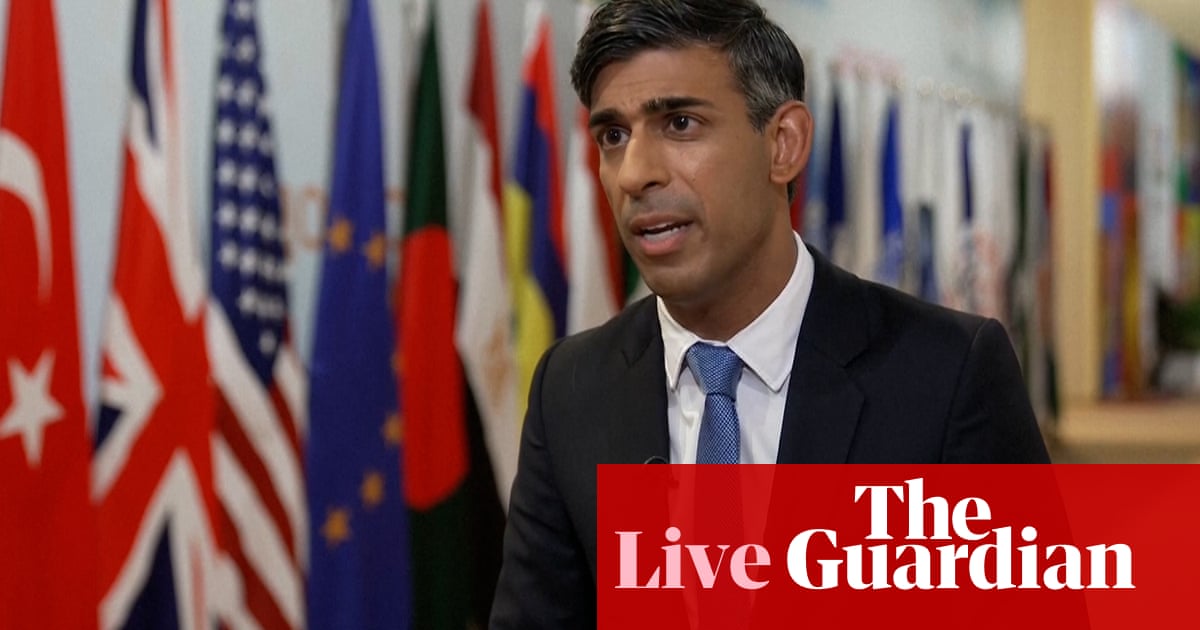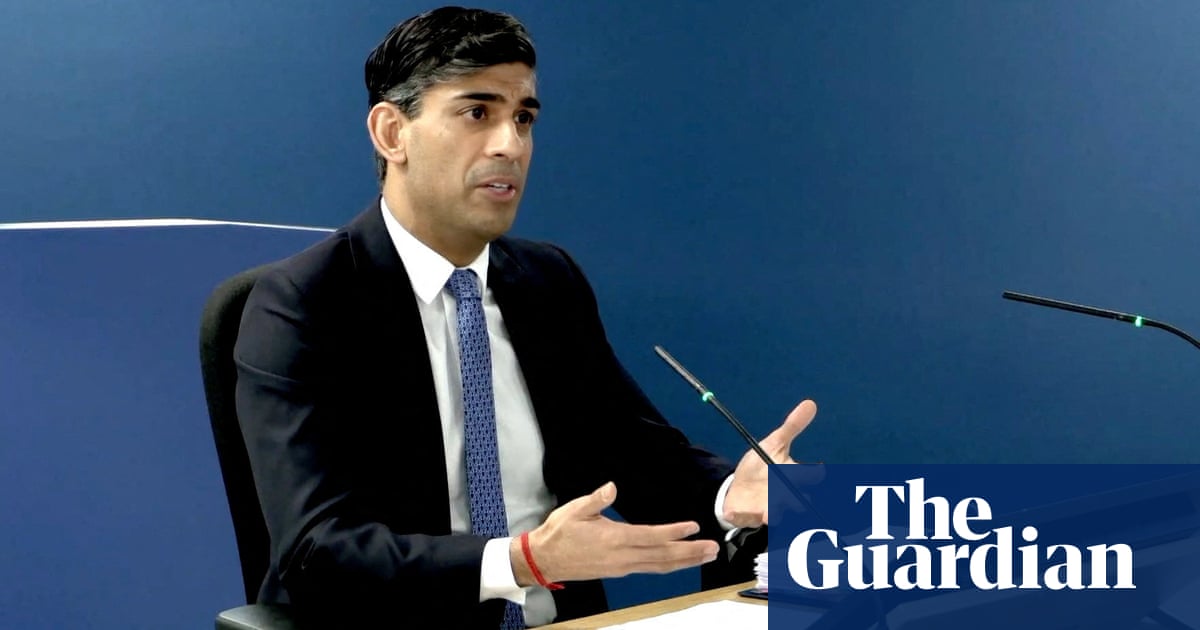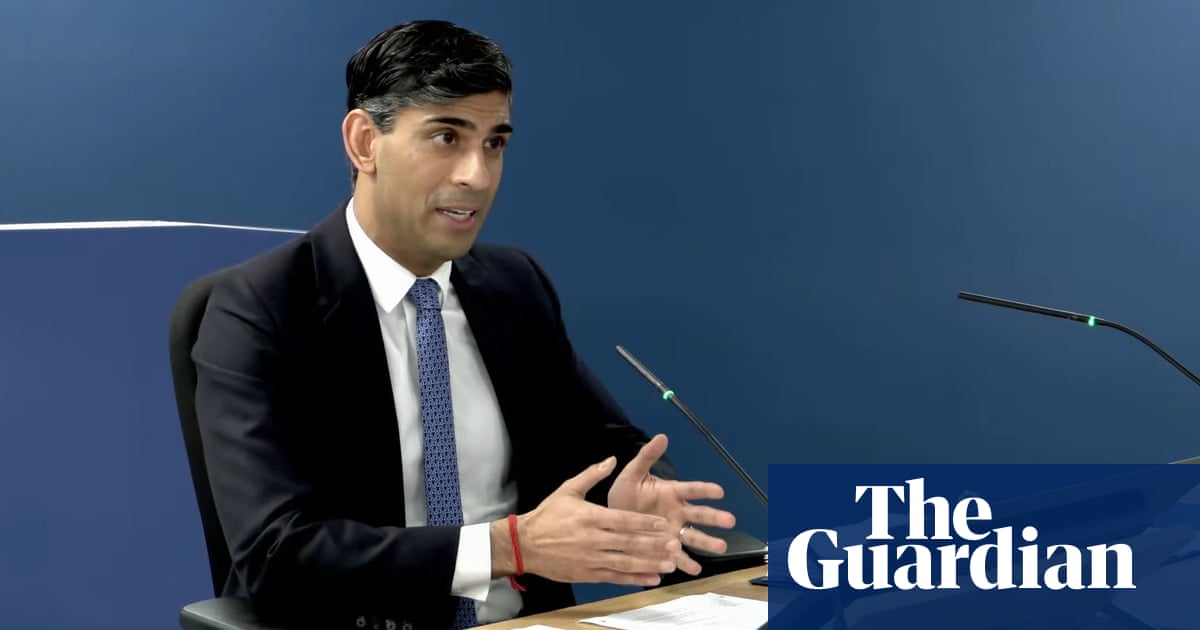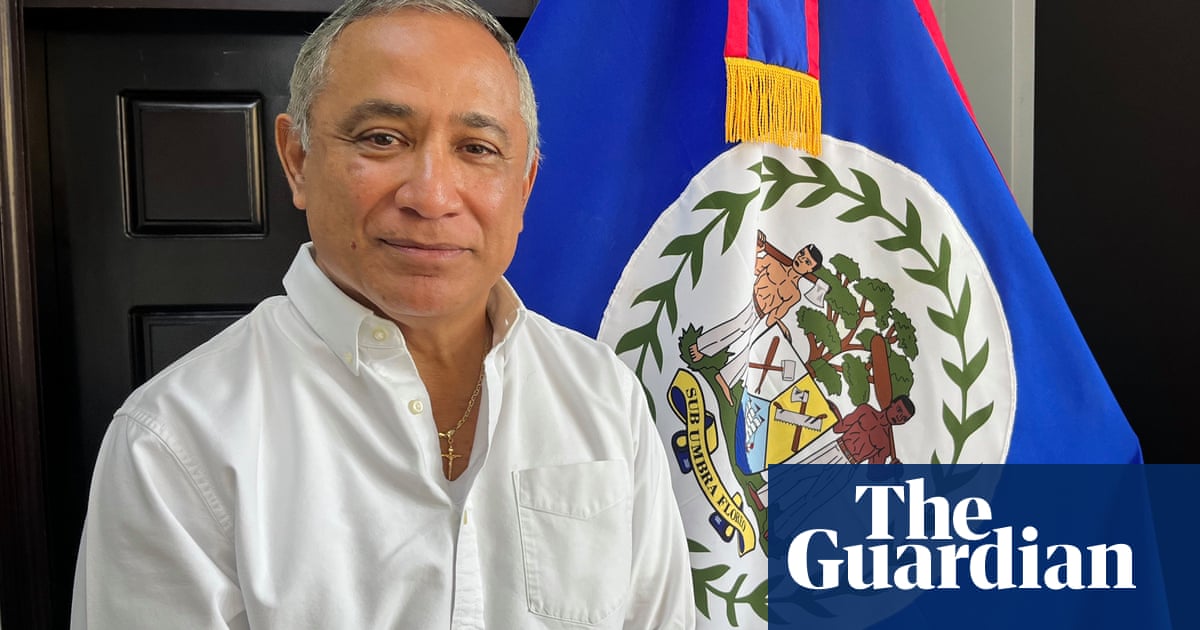
Sunak says he told Chinese PM at G20 summit that actions to undermine British democracy are "completely unacceptable"
Sunak says he also used the summit to express his opposition to Chinese interference with the work of parliament during a meeting with Li Qiang, the Chinese prime minister. He says he was emphatic that “actions which seek to undermine British democracy are completely unacceptable and will never be tolerated”.
UPDATE: Sunak said:
The sanctity of this place must be protected and the right of members to speak their minds without fear or sanction must be maintained.
We will defend our democracy and our security.
So I was emphatic with Premier Li that actions which seek to undermine British democracy are completely unacceptable and will never be tolerated.
I also emphasised the UK’s unyielding commitment to human rights and I was clear on the importance of maintaining stability and international law as the basis for stable relations.
The politics blog is closing now. Here’s a summary of the day’s key developments regarding the arrest of the Chinese parliamentary researcher:
Prime minister Rishi Sunak has said he told the Chinese prime minister, Li Qiang, that actions to undermine British democracy are “completely unacceptable” and will never be tolerated”. He added that the sanctity of parliament must be protected: “We will defend our democracy and our security.”
Liz Truss, the former prime minister, said that China is the “largest threat, both to the world and to the United Kingdom, for freedom and democracy”.
Oliver Dowden, the deputy prime minister, said there is a “strong case” for treating China as a ‘state of concern’ under the new National Security Act.
Labour leader Keir Starmer asked Sunak to say if he complained to China about the latest spying case before this weekend. Sunak replied that there is a limit to what he can say because of the ongoing police investigation. But he added he has been clear with the Chinese that interference in democracy is unacceptable, such as the activity alleged to have taken place, and that James Cleverly, the foreign secretary, raised these issues on his recent visit.
In other news:
The presence of crumbling concrete has been confirmed in parliament. There is no “immediate risk”, according to structural engineers, and mitigations will be put in place where necessary, a parliamentary spokesperson told reporters.
Lord Agnew, who as academies minister 2017-20 was also responsible for school capital spending, told GB News he had about 10 meetings with the Treasury to try to secure a long-term funding envelope to deal with reinforced autoclaved aerated concrete (Raac) but was turned down.
Sunak was accused of making MPs feel “very depressed” after he sidestepped pleas to publicly call for the release of Briton Jagtar Singh Johal earlier.
Chris Heaton-Harris, the Northern Ireland secretary, has claimed that no one has produced a viable alternative to the government’s much-criticised Troubles legacy bill. The bill, which is set to finish its passage through parliament imminently, would offer limited immunity for some perpetrators of crimes committed during the Northern Ireland Troubles and is opposed by all parties in Northern Ireland and by the Irish government, which is thinking of challenging it at the European court of human rights. Leo Varadkar, the taoiseach (Irish PM), said there was still time for the government to pause the bill.
Unions at the TUC in Liverpool passed a motion calling for “a strategy of non-compliance and non-cooperation” with the Strikes Act, the new legislation imposing minimum service levels in key public services during strikes.
That it’s from the Politics blog for now. Thanks for following along with me, Donna Ferguson.
Neil Coyle, a Labour member of the Foreign Affairs Committee, has said that staff working for him and other MPs involved in sensitive subjects should receive extra vetting.
He told the BBC:
Parliament should automatically and routinely check staff working for MPs on sensitive issues including foreign affairs and defence. Enhanced checks would be welcome to almost all MPs and help reduce some risks.
Given the level of exposure this should be routine and cannot be overlooked any longer given the resources other states now invest targeting Westminster.”
A spokesperson for the House of Commons said:
Our vetting is line with government policy, and follows the national security vetting policy that is set by government. We do not and will not comment on specific cases.”
Peers in the House of Lords could reduce their eco footprint and buy fewer new clothes if parliament was prepared to tackle its moth problem, a Conservative lord has said.
During a debate about the environmental impact of textiles manufacture and the benefits of “slow fashion”, the Tory former cabinet minister Lord Forsyth of Drumlean called on the House of Lords to do “something about the moths”.
The comment came after Conservative peer Lady Jenkin urged other Lords to participate in this month’s Second Hand September initiative, revealing her own commitment to the cause.
She said:
Speaking as somebody who made a vow 12 years ago to never buy anything new for the rest of my life, might I encourage the minister to join this campaign? EBay, charity shops, Swishing and Vinted are all alternatives to us buying new clothes and creating more of a problem.”
The environment minister Lord Benyon then said:
She is a living example that buying from thrift shops is what we should all be doing. This month in particular, we should be encouraging people to do that. Slow fashion is the way forward.
We need to continue to make sure that we are requiring manufacturers and retailers to make and sell goods that last longer, are properly supplied and do not go to landfill when they come to the end of their natural life.
Recycling is an emerging technology, but the most important thing is that we all stop buying so many new things.”
Lord Forsyth then decided it would be relevant to call for action to be taken with regard to the moths. He said:
Following on from the question from Lady Jenkin, might we all be able to avoid buying new clothes if the authorities in this house did something about the moths?”
There have been longstanding demands at Westminster for the ageing estate to be fumigated to rid it of the pests, which can cause serious damage to clothes, carpets and upholstery.
Earlier, Lord Benyon told the upper chamber that reducing textiles waste would be critical to the UK hitting its net zero goal.
He said:
We propose to ban textiles waste from landfill, require clothing retailers to provide in-store take-back of unwanted textiles and ask businesses to separate textiles waste for reuse and recycling.”
The amount of clothing produced doubled between 2015 and 2020. This was because of a higher number of middle-class people and their demand for clothing, and it has come at a great environmental cost.
The clothing industry may not be the biggest emitter, in terms of carbon and its impact on water, but the government are working internationally and domestically to tackle this very serious problem.”
Presence of Raac confirmed in parliament
The presence of reinforced autoclaved aerated concrete (Raac) in parliament has been confirmed.
A parliamentary spokesperson told PA reporters:
As part of routine ongoing investigations Raac was identified in one area of the palace.
Structural engineers have confirmed there is no immediate risk. Where Raac is found, mitigations will be put in place as necessary.”
Defiant peers have maintained their standoff with the government in pressing their demand for moves to strengthen a crackdown on dirty money, PA reports.
The House of Lords backed by 211 votes to 185, majority 26, steps to ensure more businesses are liable for prosecution for failing to prevent fraud.
The change, proposed by Tory peer and former senior law officer Lord Garnier, would limit an exemption to only the smallest companies, so-called micro-organisations, rather than all small and medium-sized enterprises (SMEs) as proposed by the government.
Former Conservative justice minister Lord Faulks also successfully led a defeat of the frontbench, by 218 votes to 186, majority 32, in seeking financial protection for enforcement agencies in chasing down proceeds of crime.
It follows concerns that the threat of high legal bills associated with such cases was having a chilling effect on investigators.
Similar changes backed by peers to the economic crime and corporate transparency bill had already been rejected by MPs.
The latest setbacks for the government mean a continuation of the tussle known as parliamentary ping-pong, where legislation is batted between the unelected chamber and the Commons, until agreement is reached.
The bill is the second part of a package aimed at tackling corruption and money laundering.
After Oliver Dowden gave his statement on the arrest of the parliamentary researcher accused of spying for China, the veteran MP for Harwich and North Essex, Sir Bernard Jenkin, asked:
Why is the government so squeamish about not just talking about threats from China, but by calling China a threat?
What is the difference between a challenge and a threat?”
Dowden reiterated that the government was “absolutely clear about the threat that China represents”, adding: “But at the same time, it is right that we engage with China and that is the approach that we are taking alongside working very closely with our allies.”
Rishi Sunak was accused of making MPs feel “very depressed” after he sidestepped pleas to publicly call for the release of Briton Jagtar Singh Johal earlier.
Conservative Alicia Kearns, who chairs the foreign affairs committee, said MPs were unclear about the outcomes of the discussions that Sunak had when he met the Indian prime minister, Narendra Modi, on the fringes of the G20 summit in New Delhi last weekend.
She said:
Will the government now finally officially call for him to be released because the UN has accepted he is arbitrarily detained and does the prime minister believe that he has been unfairly treated or even tortured while he’s been held?”
Johal, a Sikh blogger from Dumbarton in Scotland, was in Punjab in northern India for his wedding in 2017 when his family said he was arrested and bundled into an unmarked car.
Sunak replied:
We are committed to seeing Mr Johal’s case resolved as soon as possible. We continue to provide consular assistance to him and his family and have raised concerns about issues including consular access to Mr Johal, the judicial process and reports of mistreatment with the Indian government on multiple occasions, including myself with Prime Minister Modi just this weekend.”
Martin Docherty-Hughes, the SNP MP for West Dunbartonshire, then asked Sunak to meet him and Johal’s family so he can tell them exactly what he intends to do on their behalf.
In response, Sunak merely referred Docherty-Hughes to his previous answer and added that the foreign secretary, James Cleverly, had already met Johal’s family. This meeting, with Johal’s brother Gurpreet, took place in January – with Gurpreet later saying he had been disappointed by the discussion. “What we need from the foreign secretary is decisive action; what we got is more empty words,” Gurpeet said at the time.
Following Sunak’s response to Docherty-Hughes’ question, Labour former minister Sir Chris Bryant added:
Surely one of the things that should keep the prime minister awake at night is whenever a British national is arbitrarily detained in a foreign country.
You would hope that ministers, and the prime minister himself, would summon up every ounce of energy to try to get people released.
I’m sorry but I think quite a lot of us are very depressed by the prime minister’s own answer to (Ms Kearns) earlier about Jagtar Singh Johal, who has been arbitrarily detained now for six years.
Everybody knows that he is being tortured and that he is being mistreated.
I took the prime minister to say that he has not called for his release. Is that really the truth?”
Sunak replied:
We’ve consistently raised our concerns about Mr Johal’s case with the government of India, including allegations of mistreatment and the right to a fair trial.
That’s why the Foreign Office and ministers are providing direct support to Mr Johal’s family and why I raised this specific case with Mr Modi.”
Crispin Blunt, a Conservative MP and former foreign affairs committee chairman, has told the BBC he did not think parliamentary committee members had much access to sensitive information.
He said on BBC Radio 4’s PM programme: “It certainly would have been my working assumption that any state intelligence service worth its salt would be able to see almost anything we’re doing.”
Asked if, as a former committee chief, he had any secrets worth seeing, he replied: “No, not so far as I was aware of.”
On the same programme, the shadow foreign secretary, David Lammy, suggested the debate over whether China represents a “threat” or a “challenge” could be a distraction.
“Frankly, the debate does turn me off a little. We need to focus on the substance of our strategy towards China, not a binary debate about the word,” the Labour MP said.
“Reducing our relationship to one word is very difficult.
“The truth is, all countries engage in spying, but it is very important we take our security and information that can fall into enemy hands as seriously as possible.”
No one has produce better alternative to much-criticised Troubles legacy bill, says Northern Ireland secretary
Chris Heaton-Harris, the Northern Ireland secretary, has claimed that no one has produced a viable alternative to the government’s much-criticised Troubles legacy bill.
The Northern Ireland Troubles (legacy and reconciliation) bill, which is set to finish its passage through parliament imminently, would offer limited immunity for some perpetrators of crimes committed during the Northern Ireland Troubles. It is opposed by all parties in Northern Ireland and by the Irish government, which is thinking of challenging it at the European court of human rights.
Heaton-Harris acknowledged the opposition to the bill today, but said no one had come up with a better idea for resolving legacy issues. At an event with Leo Varadkar, the taoiseach (Irish PM); and Maroš Šefčovič, the European Commission vice-president for interinstitutional relations, where they were unveiling new funding for Northern Ireland (see 4.30pm), Heaton-Harris said:
Lots of people ranged against the legacy bill, but no-one has an alternative for what could possibly replace it, and no one can tell me that the current situation that has been running for the last 25 years has been satisfactory to the families of victims either.
So I fully acknowledge this is not perfect. I’ve met with an awful lot of people who lost loved ones in the Troubles, I’ve met with people who had family members maimed, I’ve met with people who are truly victims, I cannot put myself in their shoes.
But 25 years on, some of these families will have been looking for answers [from] when the Troubles commenced – you could say the best part of 40 or 50 years – and haven’t really received them.
This is an honest and true attempt to try and get information for those families.
Varadkar said there was still time for the government to pause the bill. He said:
I had a chance to meet with the secretary of state today and once again expressed the Irish government’s opposition to the legacy bill.
It isn’t law yet, it still has to pass through the House of Lords and receive royal assent. Once again, I appealed to the UK government to pause this, we don’t think it is the right thing to do.
That’s all from me for today. My colleague Donna Ferguson is now taking over.
TUC votes for policy of "non-compliance and non-cooperation" with Strikes Act
As expected, unions at the TUC in Liverpool passed a motion calling for “a strategy of non-compliance and non-cooperation” with the Strikes Act, the new legislation imposing minimum service levels in key public services during strikes.
The RMT leader, Mick Lynch, told delegates: “That’s what we have to do – that’s the message. We are a fighting union movement and we are going to turn this legislation over.”
Unions believe the new law, which allows employers to specify which workers must turn up on strike days, is unworkable in its present form.
The TUC general secretary, Paul Nowak, has stressed that it is not encouraging workers to disobey the law – but the TUC has reported the legislation to UN watchdog the International Labour Organisation (ILO), and will seek to defend any striking worker sacked for failing to comply.
The motion calls for a special conference once full details of how the legislation will be implemented to decide how unions can best resist it.
Downing Street has said France and Britain could do more to cut the number of small boat Channel crossings. After the publication of figures showing that the number of people arriving in the UK on small boats this year has now passed 23,000, with more than 2,000 arrivals recorded last week alone, the PM’s spokesperson told journalists:
I think we’re in no doubt on both sides there is certainly more we can do.
Obviously, we are in touch with our French counterparts about taking further action to prevent crossings.
I think it is still worth noting that, for the first time ever since these sorts of crossings began, the numbers are tracking lower than they did the previous year. That is notable and significant.
But, obviously, there is much more to do to get this situation under control. So, we will continue to work very, very closely with our French counterparts to up interceptions, both at the channel but further upstream as well.
I have updated the post at 4.13pm. Oliver Dowden, the deputy PM, told MPs there was a “strong case” for treating China as a state of concern under the new National Security Act, which is potentially significant. (The original post said “strong case” applied to something else, because initially it was not clear to me what he had said.)
Sir Julian Lewis, the chair of the intelligence and security committee, asks if Sunak will agree to meet the committee. When it was set up, the PM used to meet it every year, he says. But those meetings have not taken place since 2014.
Sunak says he will consider the request.
Alicia Kearns, the Conservative chair of the foreign affairs committee, gets the first backbench question to Sunak. She had contacts with the researcher accused of spying, but she does not ask about this case. Instead she asks Sunak about Jagtar Singh Johal, the British man detained in an Indian jail on terror charges. In response, Sunak says the government has raised this case with the Indian government.
Sunak is replying to Starmer.
On the spying allegation, he says there is a limit to what he can say because of the ongoing police investigation. But he says he has been clear with the Chinese that interference in democracy is unacceptable, such as the activity alleged to have taken place, and that James Cleverly, the foreign secretary, raised these issues on his recent visit.
Keir Starmer is responding to Sunak. On the G20, he says it is disappointing that the language on Russia was weaker than after the last G20 summit.
On China, he asks Sunak to say if he complained to China about the latest spying case before this weekend.
And if the government is not going to categorise China as a threat, what will the government do to tackle infiltration by the Chinese security services, he asks.
Sunak says he told Chinese PM at G20 summit that actions to undermine British democracy are "completely unacceptable"
Sunak says he also used the summit to express his opposition to Chinese interference with the work of parliament during a meeting with Li Qiang, the Chinese prime minister. He says he was emphatic that “actions which seek to undermine British democracy are completely unacceptable and will never be tolerated”.
UPDATE: Sunak said:
The sanctity of this place must be protected and the right of members to speak their minds without fear or sanction must be maintained.
We will defend our democracy and our security.
So I was emphatic with Premier Li that actions which seek to undermine British democracy are completely unacceptable and will never be tolerated.
I also emphasised the UK’s unyielding commitment to human rights and I was clear on the importance of maintaining stability and international law as the basis for stable relations.
Sunak says he had three goals at the G20 summit. He says he wanted to increase the diplomatic pressure on Russia, and “call out” its disruption of global food supplies in the Black Sea; to show that democracies can lead global action on issues such as climate change; and to strengthen Britain’s economic ties with other countries. He claims he made progress in all these areas.












